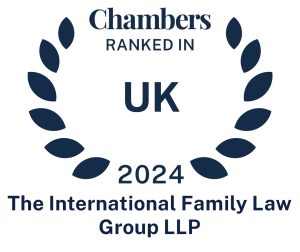One of the features of the new family law landscape on the UK leaving the EU is the re-emergence of sole domicile, a jurisdictional connecting feature in English law over many decades. It is now a primary basis for divorce as it was until the end of February 2001 when Brussels II first arrived. It is no longer a restriction on the family courts’ power to make needs-based orders. UK domiciliaries again have access to the family courts of England and Wales. What is there not to rejoice and to welcome back into English family justice with open arms!
Until anyone wants to have a family court order recognised or enforced in some countries abroad. Whereupon the exuberance of the party for a returning friend might instead prompt just a little reflection. It is still early days but where might there be some concerns if proceeding on sole domicile in relation to some family court proceedings?
Specifically this arises in respect of divorce recognition, 2007 Hague and Lugano. Each are dealt with in turn.
Divorce recognition
From March 2001 until the end of December 2020, divorces granted by a civil court of a member state of the EU would be recognised throughout the EU. From 1 January 2021, recognition will be via the 1970 Hague Recognition Convention of which only half of the EU member states are signatories. Brussels II laid down specific grounds of jurisdiction for a divorce which would be recognised. 1970 Hague doesn’t in such a dogmatic fashion. However recognition of a divorce is conditional on certain connections with the state where the divorce occurred. They are set out in Art 2 and are fairly broad. They include habitual residence of the respondent, habitual residence of the petitioner along with either one year habitual residence or last joint habitual residence, joint nationality, nationality of the petitioner along with habitual residence or one year habitual residence in the previous two years or the nationality of the petitioner along with physical presence at the time of institution of the proceedings and the parties last resided together in a country whose law, at the time of commencement of the proceedings, did not provide for divorce. For countries such as England and Wales which uses domicile instead of nationality, it provides, Art 3, that habitual residence shall be deemed to include domicile.
It will be seen that this is not the complete and simple sole domicile of the petitioner although would seemingly cover sole domicile of the respondent. It might be thought that most sole domicile divorce cases would come within these categories but undoubtedly there will be some sole domicile divorce cases which will not satisfy Art 2 1970 Hague. If it will be important to have a divorce recognised in a 1970 Hague signatory state care should be taken by a petitioner before necessarily relying on sole domicile.
Recognition for maintenance claims: 2007 Hague
The introduction of the EU Maintenance Regulation in 2014 brought the sudden and unexpected change that the family courts of England and Wales no longer had the power to make needs-based orders if the only connecting feature was sole domicile. This was even if there was no other EU member state involved. It led to much injustice for UK domiciliaries wanting their family affairs dealt with back home. The EU law came to an end for all new cases with effect from 1 January 2021. Instead reliance will be placed on the 2007 Hague Maintenance Convention. Unlike the EU law it does not prescribe jurisdictional connections before an order can be made. So the family Court of England and Wales has had its power restored to make needs-based orders when the only connection is sole domicile. A number of practitioners held off commencing proceedings in 2020 so that this power was available. But if a practitioner then wishes to pursue enforcement of a needs-based order in the EU, or indeed in any 2007 Hague signatory country, it is important to look at the 2007 provisions.
A maintenance order, understood to be a needs-based order, made in one signatory state is to be recognised and enforced in another contracting state if there are a number of connecting features set out at Art 20.1. These include for example habitual residency of the respondent, submitting to the jurisdiction, habitual residence of the creditor, habitual residence of a child, agreement for the jurisdiction and then, crucially for these purposes, an order made in proceedings regarding personal status or parental responsibility unless based on the nationality of one of the parties. This last provision reflects jurisdiction in the EU maintenance Regulation. Personal status would be invariably divorce. parental responsibility would be invariably Children Act proceedings. This 2007 recognition is not available if based on the jurisdiction of sole nationality. Within EU law was provision that, for the UK, domicile should be treated as if nationality. This does not however appear in 2007 Hague. It is not clear if subsequently or by interpretation or practice it will be extended to sole domicile. In other words if there was a needs-based order in divorce or children proceedings and the only connecting feature was sole domicile, would this be a bar on recognition and enforcement under 2007 Hague? Practitioners should be cautious, and preferably check in the jurisdiction where enforcement may be likely as to whether any recognition or enforcement issues might arise.
Any impact may be mitigated by another jurisdictional connecting feature namely if a party took part in the proceedings, submitted to the jurisdiction, then the decision of the maintenance order could be recognised. It is not yet clear how these separate provisions interrelate and whether submitting to the jurisdiction might trump sole nationality; the indications are that it should but again this is a warning to practitioners to take further care at the outset.
Recognition for maintenance claims: Lugano Convention
The UK was a member of this international law until 31 December 2020 and has applied to join but so far, the EU has not agreed. It is for recognition and enforcement of civil judgements and therefore far beyond the confines of family law; in this context it applies to family maintenance, needs-based provision only. There is huge pressure on the EU from civil litigation lawyers and institutions to allow the UK to join. If it does over the coming months, it will trump 2007 Hague as far as jurisdiction is concerned.
For family lawyers, already with the benefit of 2007 Hague it is questionable whether it is needed. But if it does become law, the jurisdictional elements both generally and specifically in the family law context are very complicated and will produce significant litigation until clarity and certainty arrives.
The basic provision under Lugano is that persons domiciled in a contracting State should be sued in the courts of that state regardless of nationality. It then goes on to make ancillary provisions for nonnationals who are domiciled and when someone may be sued in a non-domiciliary state. As to domicile itself, Lugano provides that to determine whether a person is domiciled shall be in accordance with internal, local law. For England this is set out in the Civil Jurisdiction and Judgements Act 1982 as amended. This provides that an individual is domiciled in the UK for Lugano purposes if and only if he is resident in the UK and the nature and circumstances of his residence indicates that he has a substantial connection with the UK. A substantial connection is presumed by being resident and has been so resident for the last three months or more unless the contrary is proven.
It will be seen immediately that this is a very long way from the traditional understanding of the jurisdictional basis of sole domicile, or indeed habitual residence. It creates presumptions and redefinitions of familiar concepts to English family lawyers; another reason why it will produce much uncertainty and litigation. But on this general Lugano basis of jurisdiction, there must be real doubt whether the traditional sole domicile connection will be sufficient for the English court to be able to make effective needs-based orders if it is to be recognised and enforced in another Lugano member state which will include all EU countries.
However, Lugano has an additional jurisdictional provision in respect of family court maintenance. In basic summary, a person can be subject to a family maintenance claim in a Lugano state in which they are not domiciled if it is a state where the claimant is domiciled or habitually resident, or there are divorce proceedings unless based on sole nationality of either or there are parental responsibility proceedings and again unless based on the sole nationality of either. However, unlike EU laws such as the maintenance Regulation which specifically states that in the case of the UK the restriction on sole nationality should be construed as sole domicile, there is nothing in the Lugano Convention. So it would seem that a maintenance order, needs-based provision, in proceedings ancillary to a divorce based on sole domicile would be available for recognition and enforcement and not barred because of the jurisdictional basis. Simply because England does not use sole nationality. Nevertheless it must be questionable if this state of affairs will continue. It might be that some EU states will simply refuse to recognise and enforce if the jurisdictional basis from England had been sole domicile by analogy with the equivalent EU law. It may be changes will subsequently be made. As with 2007 Hague, caution should be exercised if seeking a needs-based order which may need to be recognised and enforced around the EU or other Lugano signatory countries if the only jurisdictional connecting feature is sole domicile.
But what is the future of domicile anyway?
The question must be asked why we are still adhering so strongly to domicile? Some of us had hoped that the review of divorce jurisdiction required by leaving the EU would prompt discussion on the future use of domicile; in reality there was too much else to sort out to have this sort of discussion. But we need to have it. domicile is a very complex concept. It has been famously said that it is easier to see it in retrospect but that doesn’t help the parties or advisers. Its uncertainty encourages litigation. It is a very common-law concept yet other common law jurisdictions have been abandoning in favour of the far greater certainty and provability of nationality. Traditions and history will cause us to cling to domicile and quite probably well beyond the time when it has served its usefulness as a connecting feature and factor. The debate should start now about the continued use of domicile in English family law.
Conclusion
It is good that England and Wales is no longer restricted in its power to make needs-based provision when the only connecting feature is sole domicile. It’s good that sole domicile can be again a jurisdictional basis for divorce. But where orders may need to be recognised and enforced abroad, considerable care should still be taken by practitioners when relying only on sole domicile as the jurisdictional basis.
The companion article to this will look at where it may still be prudent and good practice to race to court to commence proceedings even though the EU law of ‘lis pendens’ no longer applies.
For any questions regarding English/EU family law, please contact iFLG.
For more information, full background and explanatory guidance see the book ‘Family law leaves the EU: a Summary Guide for practitioners’, LexisNexis, published in October 2020 and authored by the writer of this article.
David Hodson OBE MCIArb
[email protected]
The International Family Law Group LLP
www.iflg.uk.com
© 4 February 2021
-
Prof David Hodson OBE KC(Hons) MCIArbhttps://iflg.uk.com/team/prof-david-hodson-obe-kchons-mciarb
-
Prof David Hodson OBE KC(Hons) MCIArbhttps://iflg.uk.com/team/prof-david-hodson-obe-kchons-mciarb
-
Prof David Hodson OBE KC(Hons) MCIArbhttps://iflg.uk.com/team/prof-david-hodson-obe-kchons-mciarb
-
Prof David Hodson OBE KC(Hons) MCIArbhttps://iflg.uk.com/team/prof-david-hodson-obe-kchons-mciarb









